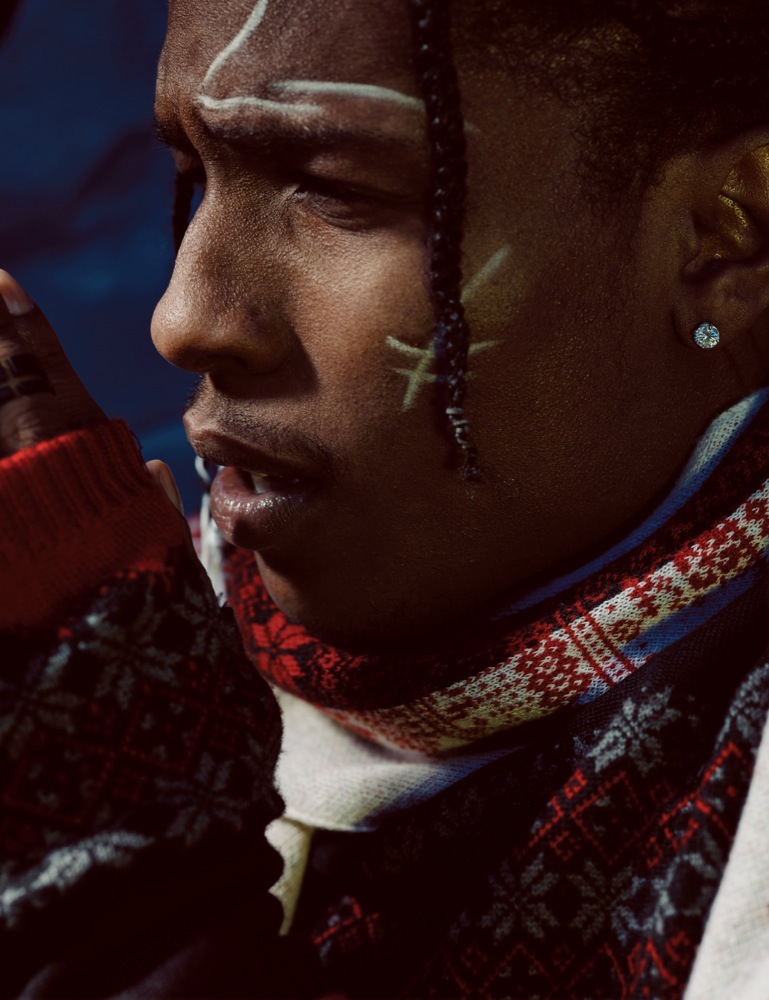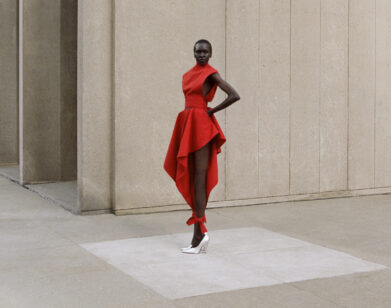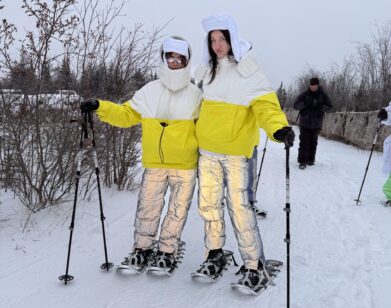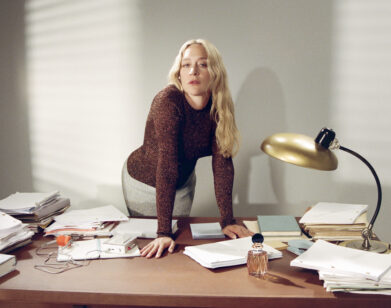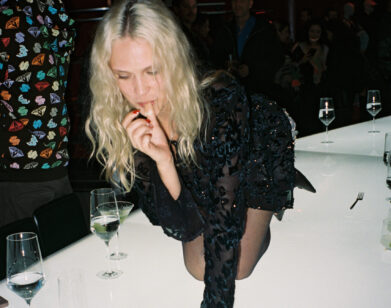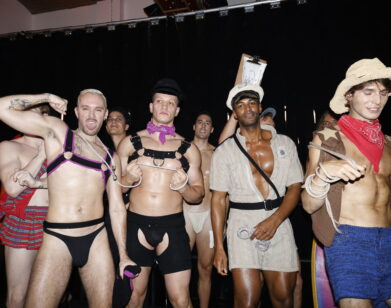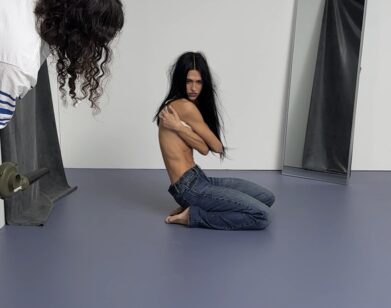A$AP Rocky x Kris Van Assche
Rakim Mayers, a.k.a. A$AP Rocky, is, at 27, one of the most wildly electric artists of his generation and also one of the most passionately knowledgeable fashionheads around. Who better, then, to showcase Kris Van Assche‘s excitable and eclectic Winter 2016 Dior Homme collection? But in so doing, in performing as the Dior Homme, is Rocky also making a little commentary, adding his own spin on the clothes to create a kind of portrait in negative of the 40-year-old Belgian designer? Is it art? Is it play?
As Rocky says, their story—that of a rapper and a designer building bridges between their mediums—has historical precedents. But, at present, there just may be no better two bridge-builders in their fields.
A$AP ROCKY: Growing up in a small town in Belgium, what interested you in fashion? What propelled you toward fashion?
KRIS VAN ASSCHE: I’m an only child, so I used to need to occupy myself, and I would always be in my room, sketching and making stuff up. I was kind of creative. And then I guess I started reading about fashion. I knew I was not the artist type; fashion just got my attention. There’s also the cute story of my grandma making her own clothes and me being really close to her, begging her to make clothes for me.
ROCKY: Do you think it had anything to do with the spirit of the country? There are so many great designers from Belgium—Margiela, Raf, Dries, Ann Demeulemeester. For me, being from New York City and doing hip-hop … It sounds cliché, but being from Harlem kind of puts me into a category.
VAN ASSCHE: I grew up in a really tiny town, and from when I was, like, 5 or 6 years old, I was just waiting to get out of there. [Rocky laughs] Everything was so conservative; there was no place for any kind of difference or personality. Learning about fashion really changed my life. The first thing I learned about fashion was the French designers being very extravagant—this was the Jean Paul Gaultier period, so he was making a lot of noise. But very quickly, I learned about these Belgian people. And that brought it close to home, because Antwerp was half an hour drive from my parents’ house. It felt like something that I could reach out to. What was it like growing up in Harlem?
ROCKY: I was oblivious to what was going on in the world. I was a badass little kid, man. That’s all I got to say about that. [both laugh] I wouldn’t say I was creative, but if you want to call Pokémon cards and apple juice and candy creative, fine. I was just trying to figure out the concept of life and society. I think by the time I was 8 years old, my dad was already moving around, and my family was moving around. It helped me get a better concept of life and how to deal with people, as opposed to being antisocial. You know how it is—when you grow up in a small town, it’s easy to stick to yourself and stay quiet. But when you’re put in radical situations and environments, and you go from one extreme to another, you have to learn how to naturally adapt. And people skills will get you a long way. But Harlem is not so different from any other urban community.
VAN ASSCHE: Were you into sports?
ROCKY: I wanted to be a football player, but then my dad shut down my dreams because he told me I would get hurt. So then I wanted to be a basketball player. But all my friends wanted to be a basketball player, and I didn’t want to do something that everybody else was doing. Actually, if you want to hear something funny, when I was 6, I wanted to be an ice-cream man. But my dad shut my dreams down with that. He said the ice-cream man was a bum. How could you talk about somebody so vital in the community like that? I just thought to myself, “That’s just fucked up. The ice-cream man never hurt nobody.”
VAN ASSCHE: When I was really young, I asked my mother if being a florist was a nice job. [Rocky laughs] And she basically said that it meant waking up really early, and that was it for me.
ROCKY: When we’re children, our parents are there to shoot down our ridiculous dreams. [both laugh] But growing up for me wasn’t too bad. I was oblivious to what was happening, so it just seemed like, you know, growing up. You don’t necessarily know what’s wrong until you become an adult.
VAN ASSCHE: I guess so. I was so bored in my small town. I had very few friends. I was more antisocial, sitting by myself in my room, making up imaginary worlds. I was basically inventing life in my bedroom. It was only when I was 18, when I went to live in Antwerp, that I had a whole new life opening up for me.
ROCKY: So when you were working at Dior the first time, with Hedi, did you always want your own line? Or was that something that developed later on?
VAN ASSCHE: The Royal Academy of Fine Arts in Antwerp is a really tough school. And I’ve always said this like a joke: They don’t make assistants at the Royal Academy; they make fashion designers. Because they push your personality so much. It’s really about finding what makes you different, what makes you an individual. That kind of helps you survive. But I was also very young when I got out there, so I was fortunate to find an internship and then get a real job for six years as an assistant. I learned so much more about reality doing that, but I also felt kind of frustrated because I was basically working to realize somebody else’s dream. At some point, you just want to realize your own dreams. So I tried to find ways of being in charge, maybe at another house or even doing something else. Just by chance, I decided to launch my own brand, which was really a jump in the darkness. I had a very comfortable full-time job, and I was renting a place and all that. And all at once I just quit everything and launched my label, because I wanted to be creatively free. I mean, I didn’t grow up thinking I wanted my name on a label; I just wanted the creative freedom.
ROCKY: Did you find it a little bit overwhelming? Did you find it to be more pressure even though you pursued it for peace of mind?
VAN ASSCHE: Of course. It’s so overwhelming that it almost paralyzes your brain. But you just jump in, like jumping into the water and hoping you won’t drown. All my friends told me I shouldn’t accept the new position at Dior because things were going pretty well with my label. I was getting a lot of attention and it was really cool to have the creative freedom I always wanted. Dior Homme was not some label that needed a total makeover. And it was obviously going to be a tough job because the brand was already popular—taking over a popular brand is difficult because nobody wants you to do exactly the same thing, but they don’t want you to change either, because it’s popular. It’s almost an impossible situation. And all my good friends told me not to do it because it would be such a drama. And it was a drama. But it was also the best learning experience I could imagine. It’s the complete opposite of my own label’s process. My own label was, like, five to ten people, depending on the year. And Dior is so many people, so many experts, the in-house ateliers. But, as a designer, there was no place on earth that I would grow so much so fast and learn so much so fast. Even if it meant having bazookas at every show of the first three to four years I was here. But it kind of all just fell in place. You learn to deal with things. Then I put my label on hold, mostly because of financial reasons. It just became too complicated with Dior growing and growing, and my label was also growing. At some point, you just feel like you’re not doing things as good as you’re supposed to do them. So there’s not much pleasure in doing them. It was a tough decision I had to make in my life. What was it like for you working with others? Even being a member of A$AP Mob, how did all that happen?
ROCKY: It’s funny. It wasn’t what I intended on doing at first, joining the A$AP Mob. I always had my own sense of fashion. But everyone in Harlem kind of had this more modern and urban aesthetic. And for some reason, when Hedi made skinny jeans popular in ’05, I thought I was the only guy wearing skinny jeans. If I didn’t have skinny jeans, I would take them to the cleaners and get them tailored. And basically, there were these other guys doing the same thing. I would be like, “Hey! Y’all look cool. What do you call yourselves?” They was like, “A$AP.” And I said, “Man, if I was part of that crew, I would be the leader or something.” [laughs] I joined about two years later, in 2007, and it was amazing, man. There was initiation. It was just like a brotherhood. And the sense of fashion, the appreciation for it and the knowledge of fashion history; I never met anyone in my age group who was aware of something besides, like, basketball. Their shit was part of my language. That solidified things. I just knew that that was home for me. No one knew who did what back then. We didn’t know anyone’s talents, capabilities. All we knew was who could put a wardrobe together or who came out looking nice. [both laugh]
VAN ASSCHE: So fashion and music has always been connected for you?
ROCKY: There’s always been a connection because groups like Run DMC—even though Adidas was sports apparel, that was really the first name brand to get co-signed to hip-hop. It gradually started to evolve when Gianni Versace became obsessed with Tupac. Versace said that Pac was the most beautiful man in the world, so I think he had, like, a man crush on him. [both laugh] And that had an influence on fashion. In the mid-’90s, everybody wore Versace because of Tupac. He was the epitome of what people wanted to look at, the fashionisto for my era. And people like Puffy starting his own brand… There are these people that personify that bridge, that connection of fashion and hip-hop. You know, we’re talking about your history. You discontinuing the line, I think that anticipates a return almost like Kanye West. Not to compare you and his brand at all, but the anticipation is just crazy.
VAN ASSCHE: For sure. When I launched my label, it was going to be forever. So it’s hard to imagine that I would not start it up again at one point. I’m not the 28-year-old that I was when first I launched it. I was young and a little naive and thought that the whole world was waiting for my collection. [laughs] I know now that it’s not just about being a genius in your kitchen; you also need the tools to get it out there. You have to have the right people around you, the right producers, having it delivered on time. It’s not just fashion; it’s fashion business. At Dior I’ve learned to be really demanding on all those things. Dior is about quality, about luxury, the highest level of fashion. And I can’t handle anything less than that. So I would need a similar kind of approach to my own label. I need to be able to deliver the same quality of work. What’s complicated about fashion is that you have to be good at so many things at the same time. You need to manage budgets, which is a tough cookie because they often tend to disagree with the creative part. You need to know a lot of people. You need to see all the latest movies. You need to see all the latest expositions. You have to know about art and speak several languages …
ROCKY: Oh, Lord. I lost already.
VAN ASSCHE: [laughs] What would you be if you were not a rapper?
ROCKY: I’d probably be an interior decorator, man. I love interior decoration and installation. That’s my way of doing art pieces. Installation is my new hobby. So now that I co-direct my videos, when I’m doing treatments, I set up opportunities for me to make these vignettes to practice a little bit. I like interior decorating. If not that, I would probably just be a stoner hippie, sitting at home all day. [both laugh]
VAN ASSCHE: We can be both, no?
ROCKY: [laughs] Seriously though.
VAN ASSCHE: Have you decorated anybody’s place?
ROCKY: Yeah. I’ve done a few installations. I’ve did one for my capsule collection with Guess Originals. We did things where we would dress in this mythical kind of era, this world. It was late ’80s and ’90s nostalgia. But, like you said, you have to watch films; you have to know people. And sometimes, that’s all I do all day. I get to watch films. I get to meet people. The inspiration varies and the imagination … The possibilities are endless. I manifest that with whatever I do. It’s not as much pressure as you have, though. Not at all. How did it feel, man, when you received the news that you would be the creative director for Dior Homme?
VAN ASSCHE: It felt like I wanted to hide under my bed for the next three months—a mixture of super excitement and being scared to death, which is actually, I think, the only healthy way to approach it.
ROCKY: Do you remember where you were when you got the news?
VAN ASSCHE: Well, it didn’t just fall from the sky; we talked about it for weeks. So it kind of grew on me. But I remember the first phone call. I was working at my own label, and they sent over this black car with black windows. And it all felt very movie-ish.
ROCKY: Man, that sounds like the mafia to me. You sure you don’t have something you want to tell us? [both laugh]
VAN ASSCHE: It was a moment.
ROCKY: That’s cool. The fact that you can even recollect where you were … I commend you, man. I don’t remember anything. I think it’s too many of those funny cigarettes catching up to me. [laughs]
VAN ASSCHE: Well, you remember when you did your first video, right?
ROCKY: First video, yeah. It was New York City, with A$AP Mob. I was so excited. That’s the day I developed this unorthodox method of making music videos, because I had no previous experience or knowledge. It was 2011, for the song called “Purple Swag.” I just told the director to catch a day in the life, and all he managed to catch was us smoking weed, drinking, riding on bikes and handlebars, and acting like little hooligans. [laughs] That’s all it was back then. Actually, I have to finish editing my film that I shot out in London. It was pretty amazing. I can’t wait for you to see it. And then I’m working with Kanye this week all week so, you know, just chilling, doing my A$AP Rocky thing. What are you up to today?
VAN ASSCHE: My workday is over because it’s past seven here. Tomorrow is going to be full-on because we’re preparing for June’s show. So I’m going to go home and have dinner and feed the cat, and that’s it.
ROCKY: Well, I’ll see you soon, in a couple weeks.
VAN ASSCHE: I’m looking forward to it.

